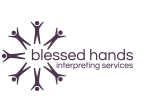On-site Sign Language Interpreting Services
On-site Sign Language Interpreting Services
Communicating on Your Behalf
Approximately 48 million Americans have hearing loss. They are your potential customers or clients, actively seeking access to the same goods and services as hearing people. Where there is accessibility, there is opportunity that leads to a lifetime of stability.
Our ‘qualified and certified’ interpreters are available to facilitate on-site communication as needed in a variety of personal, professional and commercial settings:
- PRESS/PUBLIC MEDIA: Public events, conventions, announcements – live and televised
- HEALTH CARE: Hospitals, clinics, doctors’ offices, nursing homes
- LEGAL: Law firms, law enforcement, courts
- BUSINESS/PROFESSIONAL: Interviews, training, meetings, conferences, seminars
- PROFESSIONAL SERVICES: Insurance, accounting, financial assistance
- EDUCATION: Universities, schools, parent-teacher conferences
- WORSHIP: Religious ceremonies, meetings, events
What we mean by ‘qualified and certified’ The Americans with Disabilities Act (ADA) only requires that interpreters be ‘qualified.’ In other words, they need to know the language and the community; they need to understand the subtleties of going to the doctor, dentist or a job interview.
Some states do not require certification; Michigan does. Our headquarters is in Detroit, so we are proud to be held to the higher standard. “The Division on Deaf, DeafBlind and Hard of Hearing is housed within the Michigan Department of Civil Rights. Our mission is affirming the indisputable right of Deaf, DeafBlind and Hard of Hearing individuals to secure effective communication…. ”
Qualified is good enough for most interpreting companies. Not us. Our interpreters ARE qualified and certified. In addition, they:
- Sign and adhere to the Confidentiality Agreement that is part of their BHIS interpreter company contract.
- Uphold the seven tenets of the Registry of Interpreters – which are:
- Adhere to standards of confidential communication.
- Possess the professional skills and knowledge required for the specific interpreting situation.
- Conduct themselves in a manner appropriate to the specific interpreting situation.
- Demonstrate respect for consumers.
- Demonstrate respect for colleagues, interns, and students of the profession.
- Maintain ethical business practices.
- Engage in professional development.
Source: https://www.rid.org/ethics/code-of-professional-conduct/
Interpreters all over the country are in high demand, so we need as much notice as possible to reserve the right interpreter for your task.
Communicating on Your Behalf
Approximately 48 million Americans have hearing loss. They are your potential customers or clients, actively seeking access to the same goods and services as hearing people. Where there is accessibility, there is opportunity that leads to a lifetime of stability.
Our ‘qualified and certified’ interpreters are available to facilitate on-site communication as needed in a variety of personal, professional and commercial settings:
- PRESS/PUBLIC MEDIA: Public events, conventions, announcements – live and televised
- HEALTH CARE: Hospitals, clinics, doctors’ offices, nursing homes
- LEGAL: Law firms, law enforcement, courts
- BUSINESS/PROFESSIONAL: Interviews, training, meetings, conferences, seminars
- PROFESSIONAL SERVICES: Insurance, accounting, financial assistance
- EDUCATION: Universities, schools, parent-teacher conferences
- WORSHIP: Religious ceremonies, meetings, events
What we mean by ‘qualified and certified’ The Americans with Disabilities Act (ADA) only requires that interpreters be ‘qualified.’ In other words, they need to know the language and the community; they need to understand the subtleties of going to the doctor, dentist or a job interview.
Some states do not require certification; Michigan does. Our headquarters is in Detroit, so we are proud to be held to the higher standard. “The Division on Deaf, DeafBlind and Hard of Hearing is housed within the Michigan Department of Civil Rights. Our mission is affirming the indisputable right of Deaf, DeafBlind and Hard of Hearing individuals to secure effective communication…. ”
Qualified is good enough for most interpreting companies. Not us. Our interpreters ARE qualified and certified. In addition, they:
- Sign and adhere to the Confidentiality Agreement that is part of their BHIS interpreter company contract.
- Uphold the seven tenets of the Registry of Interpreters – which are:
- Adhere to standards of confidential communication.
- Possess the professional skills and knowledge required for the specific interpreting situation.
- Conduct themselves in a manner appropriate to the specific interpreting situation.
- Demonstrate respect for consumers.
- Demonstrate respect for colleagues, interns, and students of the profession.
- Maintain ethical business practices.
- Engage in professional development.
Source: https://www.rid.org/ethics/code-of-professional-conduct/
Interpreters all over the country are in high demand, so we need as much notice as possible to reserve the right interpreter for your task.

